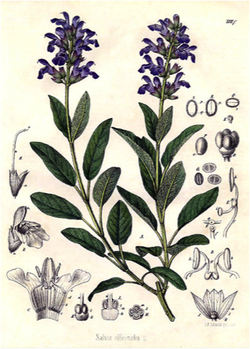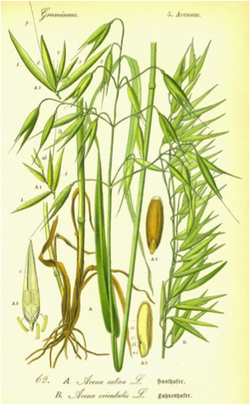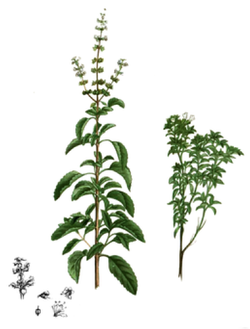 As an urban dwelling herbalist I like to focus on the issues and challenges that city folks face in their day-to-day lives. Obviously for many people high stress levels due to the demands of modern, fast-paced, caffeine-fueled living are on ongoing problem. Many of us have nervous systems that are depleted and/or over-stimulated which makes us prone to overwhelm, anxiety, and just plain exhaustion. Of course there are many factors that should be addressed when you are feeling stressed and frazzled, involving adequate sleep, proper nutrition, exercise, and making sure you have enough joy and connection in your life. So how do herbs fit into all of this? Can drinking a cup of herbal tea or taking a tincture really make any difference in the midst of a hectic day? Definitely. Here are three of my favorite herbs for worn out, highly-strung city dwellers whose nervous systems are in need of some love. SAGE Salvia officinalis This common garden plant is known more for its culinary uses than its medicinal properties, but little do most people know what a treasure trove this herb is. There’s an old saying, “Why should a man die when sage grows in his garden?”…referring to the belief that sage promotes a long and healthy life. Personally I find sage to be one of the best plants to help me immediately feel calm if I am nervous or anxious. The tea is highly aromatic and comforting, soothing to both the mind and the digestive organs (much of the nervous system is in fact housed in the gut). Sage essential oil can be used (diluted) to calm an over-active or overwhelmed mind, or inhaled before meditation to help you stay centered and focused. Traditionally sage was believed to have the ability to enhance inner wisdom and insight, thus one who is wise is called a “sage.” Besides being a wonderfully calming cup of tea, sage can also be used in cases of stress-induced headaches, and may also be useful for some people who have sleep issues due to anxiety. To make a strong cup of sage tea use up to 1 Tblsp. dried herb per cup of hot water. Let steep for 10 minutes. Add a spoonful of honey if you wish. The essential oil of sage can be diluted in a liquid spray and spritzed to impart its calmative properties. Sage should be avoided during pregnancy, but soon-to-be mamas can benefit from our next herb…  MILKY OAT Avena sativa Oats are incredibly nourishing. You probably know them as the hot morning cereal that has been an important staple crop of Northern European peoples for centuries. But besides being a nourishing food for the whole body they are specifically nourishing for the nervous system. Oats are a trophorestorative herb, which simply means that they feed nervous tissue and help to restore normal nerve function and vitality. A tea or tincture of milky oats helps people to come back from nervous exhaustion and over-work. Oats help calm frayed or shattered nerves, and ease anxiety and emotional instability. Truly, this is one of my absolute favorite herbs for it is so gentle but so powerful at the same time and makes a noticeable difference for anyone who is stressed, constantly upset, overly sensitive or depleted and worn out. Herbalists have also used oats successfully to help calm the agitation from coffee or cigarette withdrawal. If using the tincture, be sure to look for Milky Oat tincture, which means that the oats where harvested at a time when the seed yields a milky substance when crushed – this is where much of its nutritional and medicinal value lies. If making a tea, use one big handful of the dried oat tops per quart of water. Pour boiled water over the herb and let steep overnight to extract as much of the medicinal qualities as possible. One word of caution about oat – while it is one of the safest and most gentle of herbs, it may not be suitable for people who have severe gluten intolerance due to cross-contamination from gluten-containing grains.  TULSI or HOLY BASIL Ocimum sanctum and O. tenuiflorum Recently tulsi has become the darling of many Western herbalists, and for good reason – in Ayurvedic tradition it has been a revered herb for thousands of years, called the “elixir of life” and used for everything from respiratory problems to beautifying the complexion to keeping evil influences away from the home. Western herbalists now know and love this herb (a close cousin of culinary basil) for its use as an adaptogen, which is a technical way of saying that it helps us adapt to and overcome everyday stress. Like sage, tulsi is great for anxiety and overwhelm and will help you to RELAX. Used over time it can also increase energy and endurance. Ayurvedic practitioners believe that tulsi will move an individual towards whole health and vitality, protect against disease and gladden the heart. Overall it is a wonderful (and delicious!) herb that will gently reduce feelings of stress and is a delicious addition to your tea stash. To make a strong cup of tulsi use up to 1 Tblsp. of dried herb per cup of water. Let steep for at least 10 minutes. Tulsi also makes a wonderful iced tea during the summer months – keep a pitcher in the fridge to drink throughout the day. Try your hand at incorporating one or all three of these herbs into your life, and see how they support you during busy, stressful times. I’d love to know how they work for you – feel free to let me know in the comments below!
Greg Crockett
9/16/2017 10:49:57 am
Greetings. Great page, have loved both sage and tulsi in tea, was wondering if they could be used together, I think for a good cool season tea. With ginger. Comments are closed.
|
Categories
All
Archives
January 2022
|